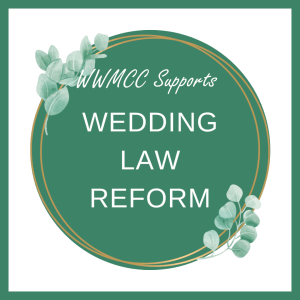
 Proposed Wedding Law Reforms 2022
Proposed Wedding Law Reforms 2022
February 2025 update – We wrote to our MP Tom Morrison to enquire about progress and received this letter from the Ministry of Justice – sigh……………
January 2025 update – disappointingly, it’s a “no progress” situation. In July 2023, it was expected that the Government would respond to the July 2022 recommendations. Eighteen months later, we are still waiting to hear!
The UK Law Commission’s report published July 2022 proposes huge changes to how couples in England and Wales may get married in future.
The report suggests that couples should have more freedom of choice when it comes to where and how they marry. So far this is just a proposal but should the law change, it could see couples able to marry in community halls, their own home, parks, gardens, on beaches or even on a cruise ship!
The report advises that the existing law on weddings in England and Wales is ‘stuck in time’, and the ‘confusing, out-of-date and restrictive marriage laws’ should be revised.
The main law that governs marriage in England and Wales dates back to 1846, and is therefore no longer relevant to today’s couples. Citing ‘needless regulation’, the report argues that as it currently stands, the laws prevent couples from being able to marry in meaningful and special locations and doesn’t easily enable fair treatment for all beliefs.
So what does all this mean we ask ourselves?
The first thing to remember here at this stage is that it is just a proposal and it doesn’t necessarily mean that the law will change. That said, the wedding industry as well as thousands of couples planning a wedding are very hopeful that there will be change. If the law does change along the lines of the Law Commission’s proposals, couples in England and Wales will be able to enjoy the following:
- A similar position as to how marriage law works in Scotland. The proposed reform would allow for the person (celebrant / officiant) conducting the ceremony to hold the licence, rather than the location to be licensed as is currently the position in England and Wales. This would allow freedom to choose where you host your wedding ceremony and allow for couples to marry in their own or maybe a friend’s garden or on the beach for example.
- Humanist ceremonies could become legally binding in England and Wales – this would allow for couples to choose ceremonies that are more personal to them, without having to also have a separate ‘legal ceremony’.
- Couples would be able to give notice to marry online – making the process of getting married more contemporary and convenient.
Would any venue in England & Wales be permitted?
The proposals state that couples can marry in any type of location, providing their officiant / celebrant agrees to it. The responsibility would lie with the officiant / celebrant to consider whether the location is appropriate in that it must be safe and ‘dignified’ for the wedding.
This could see couples marry in parks, beaches, forests, gardens and in smaller, more affordable venues such as village halls and privately at home.
Should this be made into law, couples could also wed on the water – both coastal waters for England and Wales, and on cruise ships, providing they have a home port in England or Wales.
The Current Marriage Laws in England & Wales.
Following the pandemic a change was made in wedding law . Most legally recognised weddings in England and Wales had to take place indoors or under some kind of licensed, covered structure but the pandemic changes to the law means you can marry outdoors, providing that your venue already holds a wedding licence. This allows more freedom of choice for couples, but it’s still fairly restrictive. The Government has said it plans to introduce similar reforms for religious weddings thereby allowing religious ceremonies to take place in the grounds of registered places of worship or Anglican churches or chapels, but this is yet to be actioned. In April 2022, the temporary law to allow for outdoor weddings in approved premises became a permanent law. Couples can now have a legally binding ceremony in the grounds of any licensed wedding venue.
Currently, Jewish weddings and Society of Friends weddings are permitted to take place outdoors.
Humanist wedding ceremonies (not currently legally binding in England and Wales) often take place outside and are chosen by couples who want more flexibility and a more personalised feel at their wedding ceremony. However, for their marriage to be legally recognised, the couple must then have separate ‘legal’ ceremony.
Will All This Help with the Cost of a Wedding?
There are many figures bandied about as to how much the average wedding costs. The reality is we all know that it is only too easy to let costs run away. So many elements affect the cost of your big day, the venue, catering, outfits, flowers, photography etc etc . For couples looking to cut costs of their wedding (especially in the midst of the cost of living crisis), this change, should it be made law, could allow couples to make savings by:
Removing the requirement for Government pre-approval/registration and licence for wedding venues thereby removing extra costs for wedding venues as these licences are not cheap.
Couples will be free to choose lower-cost options such as their own home, village halls etc.
It will give religious groups more flexibility about where a wedding can be held. This will mean for many couples who want a specific ceremony in line with their religious beliefs (or those wishing for a humanist ceremony) would no longer have to pay for a separate legal ceremony in order to become married.